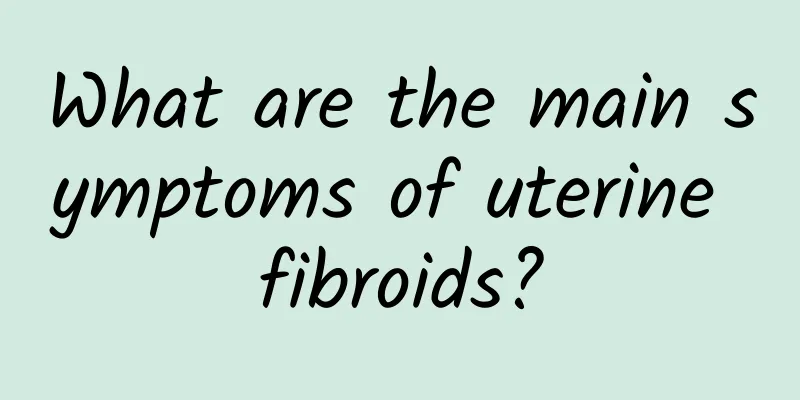What are the main symptoms of uterine fibroids?

|
What are the main symptoms of uterine fibroids? Uterine fibroids is a disease that will cause many symptoms in women's lives, but sometimes many women still cannot detect the disease in time through the symptoms. The reason may be that the symptoms are not obvious or that women do not understand the symptoms. The following mainly introduces the main symptoms of uterine fibroids. 1. Compression: Due to the influence of fibroids, the female uterus will enlarge. If the uterus enlarges, the problem is that it compresses the female bladder, rectum and peripheral nerves. After suffering from uterine fibroids, women will experience compression symptoms, leading to lumbar pain, constipation, frequent urination and other symptoms. 2. Excessive menstrual bleeding: If a woman always has irregular menstruation in her life, especially for a long time, uterine fibroids should still be considered. When the fibroids are in the growth stage, the volume of the uterus will also increase accordingly, which will disrupt the normal physiological function of the female uterus. Patients with uterine fibroids may suffer from excessive menstrual bleeding, irregular bleeding, prolonged or shortened menstruation and other diseases. 3. Excessive leucorrhea: The symptoms of excessive leucorrhea are common to almost all women with gynecological diseases, such as uterine fibroids. Uterine fibroids can cause pelvic congestion and infection, which then leads to increased vaginal flow, which mixes with traditional leucorrhea to form increased secretion. At this time, most leucorrhea is purulent and accompanied by a fishy smell. 4. Lower abdominal mass: If a woman feels a lump in her lower abdomen, especially before urinating in the morning, she may need to consider whether she has uterine fibroids. As the bladder fills, the uterus moves upward, making it easier to contact the fibroids. This feeling gradually becomes more obvious as the fibroids grow. If women find that they have a series of symptoms in their lives, such as a feeling of pressure, excessive menstrual bleeding, excessive vaginal discharge, and a lump in the lower abdomen, they need to consider whether they have uterine fibroids. At this time, they need to seek medical attention in time and try to do early examination and early treatment. |
>>: Can I get pregnant with adenomyosis?
Recommend
Causes of chocolate cysts
As a high-incidence disease, chocolate cyst disea...
Drinking honey water during these 4 periods will double the effect of detoxification and weight loss
[Key Points]: The most well-known function of hon...
Causes of vaginal candidal infection
Vaginitis is very common in life, and candidal va...
Even though I didn’t eat anything salty, my lower body still gets swollen? Nutritionists teach 5 smart ways to reduce swelling
You don’t eat anything salty or heavy-tasting, bu...
What is vulvovaginitis?
What is vaginitis? This is a concern for everyone...
What exactly is cervical erosion?
Generally speaking, women are most afraid of gyne...
How to Identify Pelvic Inflammatory Disease
How to identify pelvic inflammatory disease? Pelv...
Experts explain how to effectively prevent cervical erosion
It is understood that although many female friend...
Can congenital absence of vagina be completely cured?
Can congenital absence of vagina be treated? Expe...
What should I do if I am in menopause at the age of 40? Can I still have my period?
Women who reach menopause at the age of 40 can be...
How to identify cervicitis from symptoms? What are the folk remedies for cervicitis?
How to identify cervicitis from symptoms? What ar...
Can a blood test detect an ectopic pregnancy?
As we all know, there are many ways to test pregn...
Is it normal to have no pain during menstruation?
Is it normal to have no pain during menstruation?...
Common Western medicine treatments for acute adnexitis
What are the Western medicine treatments for acut...
What symptoms does dysmenorrhea cause?
The term dysmenorrhea must be familiar to most wo...









